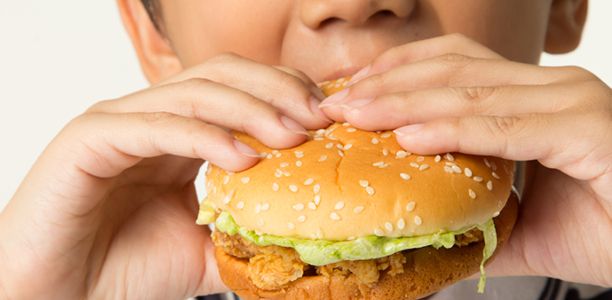All children are susceptible to junk food advertising, regardless of how parents try to influence their eating habits. This key finding is from a study led by researchers from the University of Wollongong (UOW) published in the journal Appetite.
The study, of 160 children aged between seven and 12, measured their food consumption after exposure to television and online advertising. Food consumption of all children increased after they were exposed to promotions for unhealthy food and drinks. However, the increase was greatest among those whose parents reported that they used controlling feeding practices in the home.
These practices, which have been shown to impede a child’s ability to self-regulate their own food intake, include pressuring children to everything on their plate and restricting the types of food that children are allowed to eat, such as not allowing them any access to unhealthy foods.
Children who self-regulated their eating had a smaller increase in food consumption than the children who were less able to self-regulate. But even these children who had better self-regulation were still overwhelmed by the food marketing and ate significantly more in after food marketing exposure.
Associate Professor Bridget Kelly, from UOW’s Early Start and School of Health and Society, said the study looked at how exposure to food marketing affected children’s food intake in the longer term.
“This is the first study that has looked at the impact of junk food marketing on overall diet by estimating how much extra kids eat after exposure to food marketing, and the influence on subsequent meals,” Professor Kelly said.
“We exposed the kids to either food or non-food advertising over a six-day period and looked to see how much they ate at snack time just after that advertising, and then also at a later meal to see whether they compensated for any increase that they had at the snack.”
The research paper’s lead author, PhD student Jenny Norman, said the researchers also wanted to see whether parents’ feeding practices had an influence on children’s ability to guard against the negative effects of food advertising on their eating behaviours.
“First of all, no parenting practices protected children from food advertising effects, but more so, both restrictive eating practices and pressure to eat actually increased children’s responsiveness,” Ms Norman said.
“Essentially, what the study indicates is that as a parent you are damned if you do, damned if you don’t. Your child appears to be at the mercy of whatever food industry messages they are seeing.
“Basically, the effects of advertising overrode any child’s ability to regulate themselves.”
In the study, groups of children were exposed to either television advertising only, or to both television and online advertising. Professor Kelly said children exposed to advertising from multiple sources were particularly susceptible to overeating afterwards.
“When kids see advertisements from multiple media sources it really is overwhelming and their defences are really down,” she said.
“There’s emerging evidence to suggest that children don’t see online advertising merely as marketing and so their scepticism is reduced.
“When they’re immersed in the game they don’t necessarily recall seeing the advertising, let alone thinking critically about it. So it’s just another food cue they see and process – potentially unconsciously – and then they go and eat more when the opportunity arises.” The study strengthens the case for greater regulation of food industry marketing to children.
“The message from this paper is that yes, parents are largely responsible for children’s diets, but we also need governments to step in to create supportive environments for children in terms of the advertising they see,” Professor Kelly said.
“The argument that parents should be the sole gatekeepers of children’s diets, that we don’t need so-called ‘nanny state’ government control over what advertising children see, is a furphy.
“Children aren’t able to defend themselves against this marketing. It’s more than just getting parents to be gatekeepers; this research shows that governments need to step in and regulate.”
(Source: University of Wollongong, Appetite)










